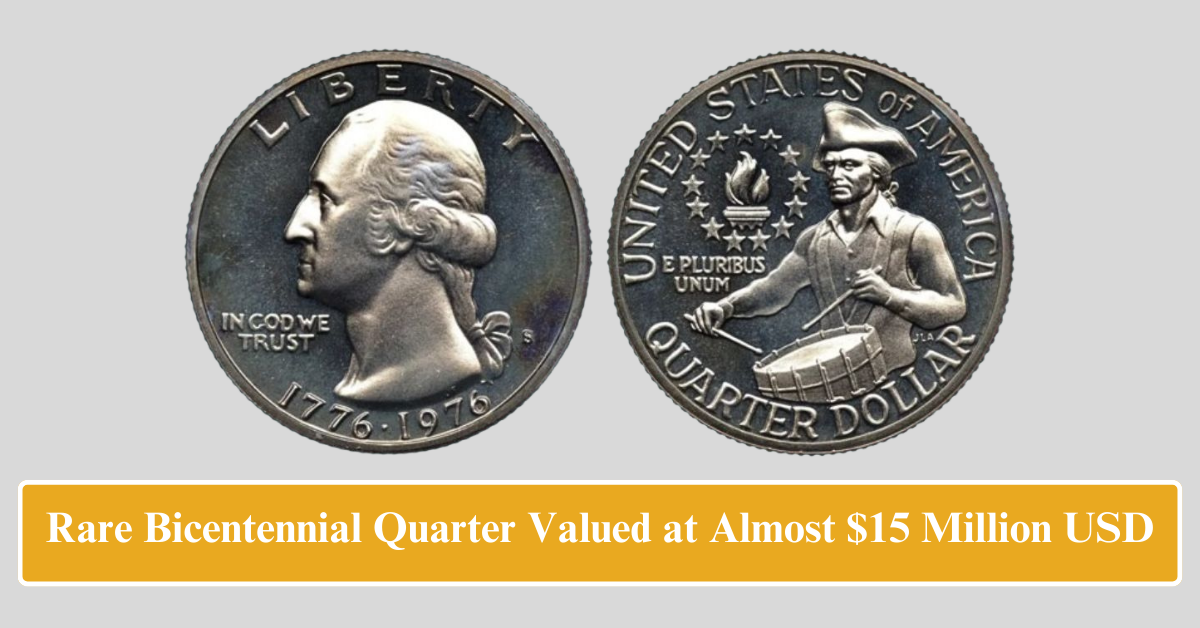In coin collecting, some quarters transcend their 25-cent face value to become highly sought-after treasures. Among these, the 1976 Bicentennial Quarter with its double die error has shocked the numismatic world with a valuation of nearly $15 million. Alongside it, several other rare quarters, valued at over $250,000 each, capture the attention of collectors worldwide. Here’s what makes these coins so extraordinary and how you might identify one in your collection.
The Bicentennial Quarter: A $15 Million Treasure
The Bicentennial Quarter was minted in 1976 to commemorate the 200th anniversary of American independence. It features a distinctive reverse design of a colonial drummer and 13 stars, making it instantly recognizable. While millions of these coins were minted, most are worth only their face value.
However, one particular coin—a double die error quarter—has become legendary for its rarity and value.
| Feature | Details |
|---|---|
| Year | 1976 |
| Error | Double die (misaligned design) |
| Estimated Value | Nearly $15 million |
Double die errors occur when a coin is struck twice with misaligned designs, creating a doubled or blurry appearance. This error, combined with the coin’s historical significance, makes it one of the most valuable quarters ever minted.
Other Rare Quarters Worth Over $250,000
While the Bicentennial Quarter’s $15 million valuation garners attention, several other quarters have also reached astounding prices. These coins are prized for their rarity, historical importance, and unique features.
| Coin Name | Year | Key Features | Estimated Value |
|---|---|---|---|
| 1932-D Washington Quarter | 1932 | Low mintage (436,800 minted) | Up to $350,000 |
| 1873-CC Seated Liberty Quarter | 1873 | Low production from Carson City Mint | Over $250,000 |
| 1896-S Barber Quarter | 1896 | Key date in the Barber series | Over $250,000 |
| 1943 Walking Liberty Quarter | 1943 | Striking errors or uncirculated condition | Over $300,000 |
| 1916 Standing Liberty Quarter | 1916 | Extremely low mintage (52,000 minted) | Over $350,000 |
Each of these quarters has a unique backstory, from limited production to minting errors, contributing to their significant value.
How to Identify Rare Quarters
1. Check for Minting Errors:
Rare coins often feature errors such as double dies, off-center strikes, or unusual markings. Inspect your coins closely for imperfections or anomalies.
2. Examine the Year and Mintmark:
Certain years and mintmarks (e.g., “D” for Denver, “S” for San Francisco) are associated with rarities. Coins minted in low quantities or during specific historical periods are more likely to be valuable.
3. Assess the Condition:
Coins in excellent or uncirculated condition command the highest prices. Look for sharp details, minimal wear, and no major scratches or damage.
4. Consult a Professional:
If you suspect you have a rare coin, seek the expertise of a numismatist or professional coin dealer. They can authenticate your coin and provide an accurate appraisal.
Selling a Rare Quarter
If you own a rare quarter, there are several ways to sell it:
- Auction Houses: Auctioning your coin through a reputable house can attract competitive bids from serious collectors.
- Coin Dealers: Professional dealers can offer immediate purchases, though you may receive slightly less than at auction.
- Direct to Collectors: Selling directly to private collectors can maximize your profits but requires networking within the numismatic community.
The Legacy of Rare Quarters
Coins like the Bicentennial Quarter and other rare specimens not only hold tremendous monetary value but also provide a tangible link to history. Their unique features, from minting errors to limited production, turn everyday objects into coveted treasures.
So, next time you check your spare change, take a closer look—you might just discover a piece of history worth a fortune.
FAQs
No, most Bicentennial Quarters are worth only 25 cents. However, coins with errors, like the double die variant, can be worth millions.
You can sell through auction houses, reputable coin dealers, or directly to collectors. Be sure to have the coin appraised first.
A coin is rare if it has a limited mintage, unique errors, or significant historical importance. Coins in pristine condition are especially valuable.
The 1976 Bicentennial Quarter with a double die error is among the most valuable, estimated at nearly $15 million.
It’s possible, though extremely unlikely. Searching through older collections or inherited coins is more promising.

